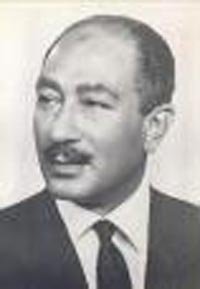
Mohamed Anwar el-Sadat (December 25, 1918 – October 6, 1981) was an Egyptian politician and President from 1970 to 1981.
He was born in Mit Abu al-Kum, al-Minufiyah, Egypt.Anwar Sadat was 1 of 13 brothers and sisters. He graduated from the Royal Military Academy in Cairo and joined an officers’ group committed to free Egypt from British control.
During World War II he was imprisoned by the British for his efforts to obtain help from the Axis Powers in expelling occupying British forces. He participated in the 1952 coup which dethroned King Farouk I. In 1969, after holding many positions in the Egyptian government, he was chosen to be Vice-President by President Gamal Abdal Nasser. When Nasser died the following year, Sadat became President.
In 1973, Sadat, together with Syria, led Egypt into the Yom Kippur War with Israel, trying to reclaim parts of the Sinai Peninsula, which had been conquered by Israel during the Six-Day War. While Israel eventually prevailed in this conflict, Sadat’s initial victories managed to restore the Egyptian morale, laying the ground for a peace settlement several years later. For many years after Sadat was known as the ‘Hero of the Crossing’.
On November 19, 1977 Sadat became the first Arab leader to officially visit Israel when he met with Israeli prime minister Menachem Begin and spoke before the Knesset in Jerusalem. He made the visit after receiving an invitation from Begin and he sought a permanent peace settlement (much of the Arab world was outraged by the visit). In 1978, this resulted in the Camp David Peace Agreement, for which Sadat and Begin received the Nobel Peace Prize. However, the action was extremely unpopular in the Arab World and especially amongst Muslim fundamentalists. Many believed that only a threat of force would make Israel negotiate over the West Bank and Gaza Strip, and the Camp David accords removed the possibility of Egypt, the major Arab military power, from providing such a threat. As part of the peace deal, Israel withdrew from the Sinai peninsula in phases, returning the entire area to Egypt by 1983.
Meanwhile internal support for Sadat dissappeared due to his arrogant style of government, economic crisis and suppression of dissidents. Even worse, Sadat’s economic policies only accentuated the gap between the rich and the poor in Egypt.
On October 6, 1981, Sadat was assassinated during a parade in Cairo by army members who were part of the Egyptian Islamic Jihad organization, who opposed his negotiations with Israel as well as his brutal use of force in the September crackdown. He was succeeded by the vice president Hosni Mubarak.

